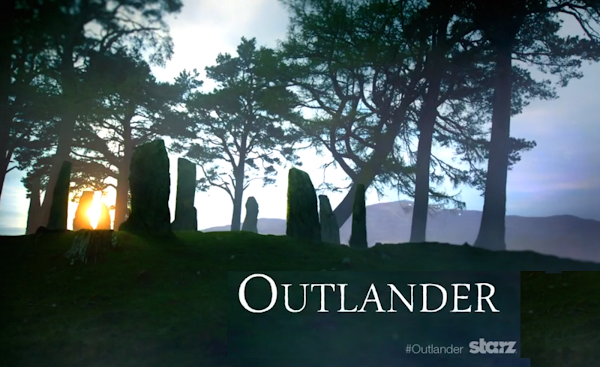Re-reading BEES (Part 4)

Here's Part 4 of my series of posts about things I've discovered on re-listening to Diana Gabaldon's GO TELL THE BEES THAT I AM GONE, Book 9 in the OUTLANDER series. (The other posts in this series are here.)
*** SPOILER WARNING!! ***
If you haven't read GO TELL THE BEES THAT I AM GONE, there are MAJOR SPOILERS below! Read at your own risk!
Some thoughts on Chapter 20, "I Bet You Think This Song is About You..."
I had forgotten most of the details in this chapter, and I enjoyed rediscovering it. The chapter runs the gamut from silliness (Claire explaining Dr. Seuss's YERTLE THE TURTLE to Jamie, which made me laugh) to total seriousness (Jamie wanting to know what Frank was like) to nostalgia (Claire's memories of the day of the reunion and the peanut-butter sandwich), with the familiar scent and feel of fresh-shelled peanuts running through the whole scene, adding vivid sensory details to their conversation. And the chapter title is very appropriate!
I laughed out loud at Jamie's pronunciation of "Dr. Seuss".
“Brianna says Dr. Seuss made a good many books. Have ye read them all, Sassenach?”I didn't recall that at all! (It really has been much too long since I've listened to BEES....)
He pronounced it “Soyce,” in correct German, and I laughed.
(From GO TELL THE BEES THAT I AM GONE by Diana Gabaldon, chapter 20, "I Bet You Think This Song is About You..." Copyright © 2021 by Diana Gabaldon. All rights reserved.)
But on a much more serious note, Jamie feeling Frank's presence as he reads his book made me shiver a bit.
“He’s talking to me,” he repeated doggedly. “He kens who I am--who I am,” he said with emphasis and looked at me, his eyes dark blue. “He kens it’s the Scotsman that took his wife from him and he’s talkin’ directly to me. I can feel him, as if he stood behind me, whispering in my ear.” I flinched, violently, and he blinked, startled.Why, indeed? That's a VERY intriguing question!
“That sounds...unpleasant,” I said. The tiny hairs prickled along my jaw.
The corner of his mouth turned up. He stopped what he was doing and took my hand, and I felt better.
“Well, it’s a mite unsettling, Sassenach. I dinna mind it, exactly--I mean, surely to God he has the right to say things to me if he likes. It’s only...why?”
(From GO TELL THE BEES THAT I AM GONE by Diana Gabaldon, chapter 20, "I Bet You Think This Song is About You..." Copyright © 2021 by Diana Gabaldon. All rights reserved.)
"The only other one I have seen with you more than once is a man. He wears spectacles.” He made circles of his thumbs and middle fingers and held them up to his eyes, miming glasses. “And a peculiar hat, with a short brim. I think he must be from your place across the stones, for I have never seen anything like that.”So Frank and Jamie (or their spirits, ghosts, or whatever you want to call them) are somehow sensing one another, across the centuries. I really like that idea. We've certainly seen Claire sensing Frank's presence from time to time, as in the very beginning of FIERY CROSS, when she wakes on the morning of Bree and Roger's wedding.
I honestly thought I was having a heart attack. There was an immense pressure in my chest, and I couldn’t breathe. The Sachem touched my arm, though, and the pressure eased.
“You shouldn’t worry,” he assured me. “He is a man who loved you; he means you no harm. [....] What is strange,” he said as I rose, “is that this man often follows your husband, too."
(From GO TELL THE BEES THAT I AM GONE by Diana Gabaldon, chapter 117, "Fungus, Beavers, and the Beautiful Stars". Copyright © 2021 by Diana Gabaldon. All rights reserved.)
Go away, Frank, I thought sternly.So why wouldn't Jamie feel him occasionally, too? But I agree with Jamie that the thought is a bit unsettling.
It was still dark outside, but the mist that rose from the damp earth was a pearly gray; dawn wasn’t far off. Nothing stirred, inside or out, but I had the distinct sense of an ironic amusement that lay on my skin like the lightest of touches.
Shouldn’t I come to see her married?
I couldn’t tell whether the words had formed themselves in my thoughts, or whether they--and that kiss--were merely the product of my own subconscious.
(From THE FIERY CROSS by Diana Gabaldon, chapter 1, "Happy the Bride the Sun Shines On". Copyright © 2001 by Diana Gabaldon. All rights reserved.)
Finally, a note about the chapter title. "I Bet You Think This Song is About You" is, of course, a reference to the Carly Simon song, "You're So Vain". Comparing this chapter to the later chapter whose title ("Don't You...?") is also taken from "You're So Vain", with an eye to the connections between the two, I found something interesting:
“Can I trust him, do ye think?”"You of all people ken what history is." I think Jamie is reminding Claire of what they learned during the Rising, that "history" consists of accounts written down by fallible human beings. And often the history books only give an incomplete picture of what really happened. Think of the way history treats Charles Stuart, for example, in contrast to Jamie and Claire's impressions of the man in person.
[....]
“You mean you’re wondering whether you can believe what he wrote in that book?”
“I am.”
“He was an historian,” I said firmly, refusing to turn my head and look behind me. “He wouldn’t--he couldn’t--falsify anything, any more than Roger could change what’s in the Bible. Or you tell me a deliberate lie.”
“And you of all people ken what history is,” he said bluntly, and stood up, knees cracking. “As for lying...everyone does that, Sassenach, if not often. I’ve certainly done it.”
“Not to me,” I said. It wasn’t a question and he didn’t answer it.
(From GO TELL THE BEES THAT I AM GONE by Diana Gabaldon, chapter 20, "I Bet You Think This Song is About You..." Copyright © 2021 by Diana Gabaldon. All rights reserved.)
Later, in Chapter 142, Jamie ponders the same question while writing out his will:
The trouble was that he didn’t dare go to Kings Mountain without making disposition of his property, in case he was right about what he thought Frank Randall was telling him.It all comes down to something that Diana Gabaldon has commented on from time to time: History is what people wrote down. Yes, Frank was a well-respected historian who took his vocation seriously, and I think Claire is right that he wouldn't lie about the fact that he'd found a James Fraser who died at Kings Mountain.
Would he lie? A historian, sworn--to himself, at least--to tell the truth as far as he could?
Any man would lie, under the right circumstances--and given what Frank Randall had certainly known of Jamie Fraser… He couldn’t risk it.
(From GO TELL THE BEES THAT I AM GONE by Diana Gabaldon, chapter 142, "Don't You...?" Copyright © 2021 by Diana Gabaldon. All rights reserved.)
The problem is that Frank is relying on primary sources that may not be 100% accurate. Consider this:
Just because the history books (and all primary sources about the Battle of Kings Mountain that Frank had access to) stated that Jamie died in that battle, it doesn't necessarily mean they were right. As far as we know, the only people who were there to see Jamie regain consciousness were Claire, Roger, and Ian. Everyone else was long gone (it was nearly two days after the battle, after all) and what they would have reported was that they had seen Jamie lying mortally wounded on the battlefield.
So the people who wrote the accounts of that battle at the time would have listed him as dead, whether it was factually true or not. Frank would presumably have looked at those primary sources, and any other thoroughly researched historical accounts of Kings Mountain, and not finding anything to cause him to doubt it, he made the same assumption. (I figure that once he strongly suspected Jamie was dead, he didn't look further for evidence of him in the historical record after October 1780.)
All of the eyewitnesses who saw Jamie that day assumed he was mortally wounded, so that's the way history recorded it -- but what if the history books got it wrong? Jamie can't take that risk, so he prudently makes sure his affairs are in order, well before the battle. Just in case.
Look here for the other posts in this series. I'll post more of my thoughts on re-reading BEES in the coming weeks. Stay tuned!







Alison S